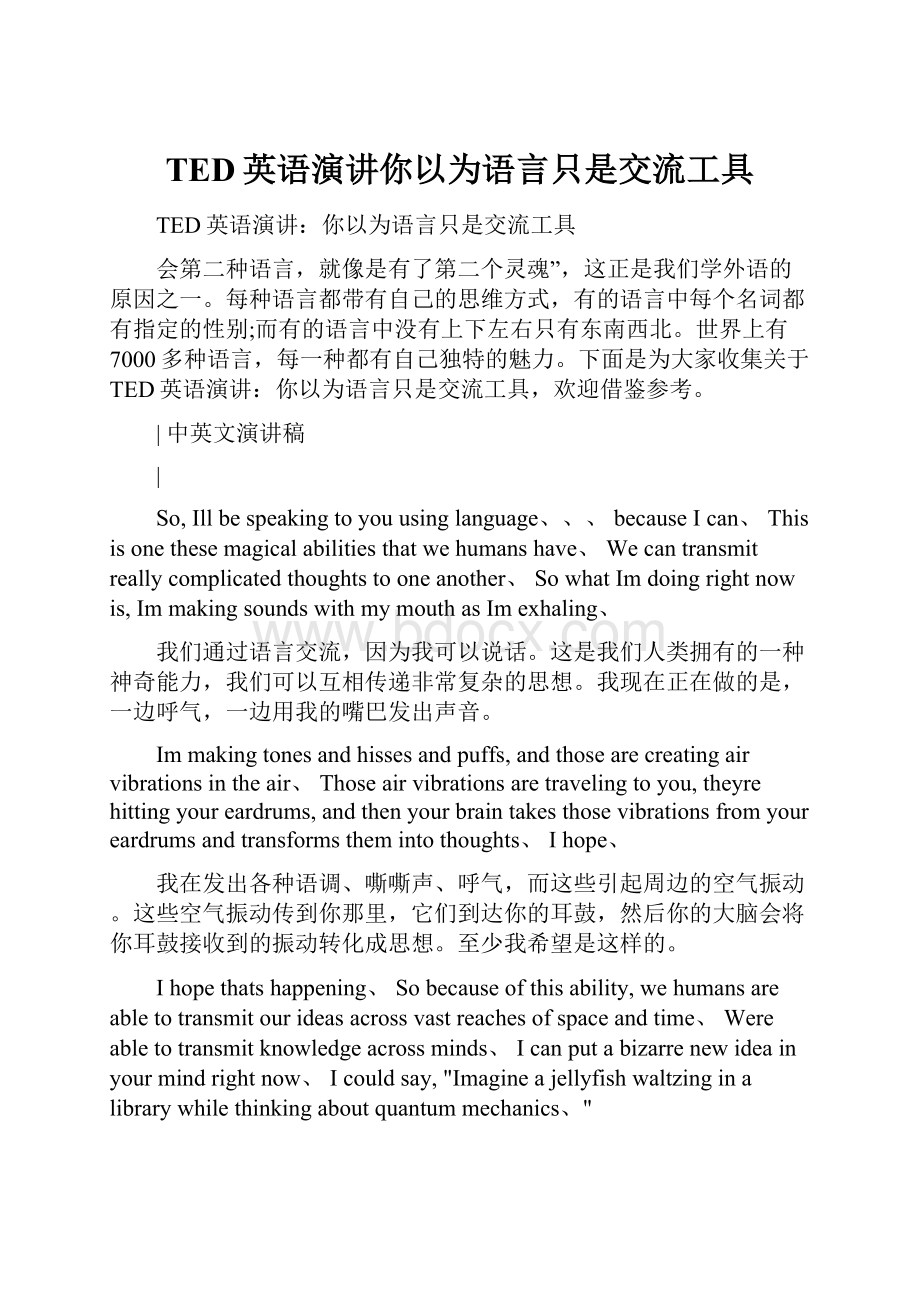TED英语演讲你以为语言只是交流工具.docx
《TED英语演讲你以为语言只是交流工具.docx》由会员分享,可在线阅读,更多相关《TED英语演讲你以为语言只是交流工具.docx(10页珍藏版)》请在冰豆网上搜索。

TED英语演讲你以为语言只是交流工具
TED英语演讲:
你以为语言只是交流工具
会第二种语言,就像是有了第二个灵魂”,这正是我们学外语的原因之一。
每种语言都带有自己的思维方式,有的语言中每个名词都有指定的性别;而有的语言中没有上下左右只有东南西北。
世界上有7000多种语言,每一种都有自己独特的魅力。
下面是为大家收集关于TED英语演讲:
你以为语言只是交流工具,欢迎借鉴参考。
|中英文演讲稿
|
So,Illbespeakingtoyouusinglanguage、、、becauseIcan、Thisisonethesemagicalabilitiesthatwehumanshave、Wecantransmitreallycomplicatedthoughtstooneanother、SowhatImdoingrightnowis,ImmakingsoundswithmymouthasImexhaling、
我们通过语言交流,因为我可以说话。
这是我们人类拥有的一种神奇能力,我们可以互相传递非常复杂的思想。
我现在正在做的是,一边呼气,一边用我的嘴巴发出声音。
Immakingtonesandhissesandpuffs,andthosearecreatingairvibrationsintheair、Thoseairvibrationsaretravelingtoyou,theyrehittingyoureardrums,andthenyourbraintakesthosevibrationsfromyoureardrumsandtransformsthemintothoughts、Ihope、
我在发出各种语调、嘶嘶声、呼气,而这些引起周边的空气振动。
这些空气振动传到你那里,它们到达你的耳鼓,然后你的大脑会将你耳鼓接收到的振动转化成思想。
至少我希望是这样的。
Ihopethatshappening、Sobecauseofthisability,wehumansareabletotransmitourideasacrossvastreachesofspaceandtime、Wereabletotransmitknowledgeacrossminds、Icanputabizarrenewideainyourmindrightnow、Icouldsay,"Imagineajellyfishwaltzinginalibrarywhilethinkingaboutquantummechanics、"
我希望如此。
正是因为这种能力,人类能够将我们的思想跨越时间和空间,传递下去我们能够将知识互相传递。
比如,我现在就可以给你传递一个奇怪的想法。
我可以说,“想象一只水母在一个图书馆里一边跳着华尔兹,一边思考着量子力学。
”
Now,ifeverythinghasgonerelativelywellinyourlifesofar,youprobablyhaventhadthatthoughtbefore、
当然如果大家的生活到目前为止都还比较顺利的话,你之前应该没有这样想过。
ButnowIvejustmadeyouthinkit,throughlanguage、
而我现在让你们有了这个想法,正是通过语言做到的。
Nowofcourse,thereisntjustonelanguageintheworld,thereareabout7,000languagesspokenaroundtheworld、Andallthelanguagesdifferfromoneanotherinallkindsofways、Somelanguageshavedifferentsounds,theyhavedifferentvocabularies,andtheyalsohavedifferentstructuresveryimportantly,differentstructures、
当然,世界上不是只有一种语言,全球有大约7000种语言。
这些语言有着各式各样的区别。
有些语言有不同的发音,不同的词汇,还有不同的结构不同的结构很重要。
Thatbegsthequestion:
DoesthelanguagewespeakshapethewaywethinkNow,thisisanancientquestion、Peoplehavebeenspeculatingaboutthisquestionforever、Charlemagne,HolyRomanemperor,said,"Tohaveasecondlanguageistohaveasecondsoul"strongstatementthatlanguagecraftsreality、Butontheotherhand,ShakespearehasJulietsay,"WhatsinanameArosebyanyothernamewouldsmellassweet、"Well,thatsuggeststhatmaybelanguagedoesntcraftreality、
于是,我们会问:
我们说的语言是否塑造了我们的思维方式这其实是个很古老的问题。
人们一直以来都在思考这个问题。
神圣罗马帝国的查理曼大帝曾说,“学会了第二种语言就拥有了第二个灵魂”这是相信语言会创造现实。
但另一方面,莎士比亚笔下的朱丽叶又说,“名字本来没有意义,一朵玫瑰花换个名字也照样芬芳。
”这就指也许语言不能创造现实。
Theseargumentshavegonebackandforthforthousandsofyears、Butuntilrecently,therehasntbeenanydatatohelpusdecideeitherway、Recently,inmylabandotherlabsaroundtheworld,wevestarteddoingresearch,andnowwehaveactualscientificdatatoweighinonthisquestion、
这些争论已经持续了几千年。
但一直以来,都没有任何数据能够帮助我们确定孰是孰非。
最近,在我的实验室和全球其它一些实验室,我们开始做研究,现在我们有真实的科学数据,可以帮助回答这个问题。
Soletmetellyouaboutsomeofmyfavoriteexamples、IllstartwithanexamplefromanAboriginalcommunityinAustraliathatIhadthechancetoworkwith、ThesearetheKuukThaayorrepeople、TheyliveinPormpuraawattheverywestedgeofCapeYork、WhatscoolaboutKuukThaayorreis,inKuukThaayorre,theydontusewordslike"left"and"right,"andinstead,everythingisincardinaldirections:
north,south,eastandwest、
让我给大家举一些我喜欢的例子。
先从澳大利亚的一个土著社群开始,我有机会跟他们接触过。
他们是KuukThaayorre人,他们住在约克角城最西边的Pormpuraaw。
KuukThaayorre人有意思的一点是,在这个土著文化里面,他们没有“左”和“右”这样的词,所有的东西都是通过基本方向来表达的:
东南西北。
AndwhenIsayeverything,Ireallymeaneverything、Youwouldsaysomethinglike,"Oh,theresanantonyoursouthwestleg、"Or,"Moveyourcuptothenorthnortheastalittlebit、"Infact,thewaythatyousay"hello"inKuukThaayorreisyousay,"Whichwayareyougoing"Andtheanswershouldbe,"Northnortheastinthefardistance、Howaboutyou"
是的,我说的是“所有的东西”。
比如,你可以说:
“哦,你西南方的那条腿上有一只蚂蚁”,或者“把你的杯子往东北偏北边移一下。
”事实上,他们打招呼的方式也是:
“你往哪里去”而回答会是:
“远处东北偏北处,你呢”
Soimagineasyourewalkingaroundyourday,everypersonyougreet,youhavetoreportyourheadingdirection、
想象一下,你走在路上,你遇见每一个人都要报告一下你朝什么方向前进。
Butthatwouldactuallygetyouorientedprettyfast,rightBecauseyouliterallycouldntgetpast"hello,"ifyoudidntknowwhichwayyouweregoing、Infact,peoplewhospeaklanguageslikethisstayorientedreallywell、Theystayorientedbetterthanweusedtothinkhumanscould、
但这会让你很快获得方向感,不是吗因为如果你不知道你前行的方向的话,你连打招呼都没法进行。
事实上,说这类语言的人他们的方向感非常好,远比我们以为人类可以做到的要好。
Weusedtothinkthathumanswereworsethanothercreaturesbecauseofsomebiologicalexcuse:
"Oh,wedonthavemagnetsinourbeaksorinourscales、"No;ifyourlanguageandyourculturetrainsyoutodoit,actually,youcandoit、Therearehumansaroundtheworldwhostayorientedreallywell、
我们曾经以为人类的方向感要比其他生物差,而我们也找了生物原因方面的借口:
“哦,我们没有可以感测磁场的鸟嘴或鱼鳞”。
事实并非如此。
如果你的语言和文化给了你这方面的训练,你是可以做到的。
世界上有些人的方向感就非常好。
Andjusttogetusinagreementabouthowdifferentthisisfromthewaywedoit,Iwantyoualltocloseyoureyesforasecondandpointsoutheast、
为了确保我们大家都同意在这点上我们的思维方式有多大差异,请大家闭上眼睛,然后指向东南方。
Keepyoureyesclosed、Point、OK,soyoucanopenyoureyes、Iseeyouguyspointingthere,there,there,there,there、、、IdontknowwhichwayitismyselfYouhavenotbeenalotofhelp、
先不要睁开眼睛,请指向东南方。
现在,你们可以睁开眼睛了。
我看到你们有指向那儿、那儿、那儿、那儿的……我自己也不知道哪边是东南方,你们也没能帮到我。
Soletsjustsaytheaccuracyinthisroomwasnotveryhigh、Thisisabigdifferenceincognitiveabilityacrosslanguages,rightWhereonegroupverydistinguishedgrouplikeyouguysdoesntknowwhichwayiswhich,butinanothergroup,Icouldaskafiveyearoldandtheywouldknow、
暂且就说,在座的大家在这个问题上的准确度不是很高。
这就是不同语言之间的认知能力的巨大差异,一群像在座的各位一样非常优秀的人分不清哪里是哪里,而如果换做另一群人,一个5岁的孩子也知道答案。
Therearealsoreallybigdifferencesinhowpeoplethinkabouttime、SohereIhavepicturesofmygrandfatheratdifferentages、AndifIaskanEnglishspeakertoorganizetime,theymightlayitoutthisway,fromlefttoright、Thishastodowithwritingdirection、IfyouwereaspeakerofHebreworArabic,youmightdoitgoingintheoppositedirection,fromrighttoleft、
人们思考时间的方式也非常不同。
这里是几张我的祖父在不同年龄段的照片。
如果我让一个英语使用者将它们按时间进行排列,他们可以会这样排,从左到右。
这跟写字的方向有关。
如果你说的是希伯来语或阿拉伯语,你则可能会以相反的方向排列,从右到左。
ButhowwouldtheKuukThaayorre,thisAboriginalgroupIjusttoldyouabout,doitTheydontusewordslike"left"and"right、"Letmegiveyouhint、Whenwesatpeoplefacingsouth,theyorganizedtimefromlefttoright、Whenwesatthemfacingnorth,theyorganizedtimefromrighttoleft、Whenwesatthemfacingeast,timecametowardsthebody、
那KuukThaayorre人我刚才提到的土著民会怎么排呢他们没有“左”和“右”的概念。
我来提示一下大家。
当我们让他们面朝南方的时候,他们将时间顺序从左向右排;当面朝北方的时候,他们将时间顺序从右到左排;当他们面朝东方的时候,他们将时间从远到近排。
WhatsthepatternEasttowest,rightSoforthem,timedoesntactuallygetlockedonthebodyatall,itgetslockedonthelandscape、Soforme,ifImfacingthisway,thentimegoesthisway,andifImfacingthisway,thentimegoesthisway、Imfacingthisway,timegoesthiswayveryegocentricofmetohavethedirectionoftimechasemearoundeverytimeIturnmybody、FortheKuukThaayorre,timeislockedonthelandscape、Itsadramaticallydifferentwayofthinkingabouttime、
发现规律了么从东到西,对吗因此对他们来说,时间跟身体的方向无关,而是跟地理有关。
对我来说,如果我面向这边,时间就是这样走的;如果我面向这边,时间就是这样走的;如果我面向这边,时间就是这样走的完全以我为中心,我每次一转身,时间也要跟着我改变方向。
对KuukThaayorre人来说,时间是跟地理有关的。
这是一种思考时间的截然不同的方式。
Heresanotherreallysmarthumantrick、SupposeIaskyouhowmanypenguinsarethere、Well,IbetIknowhowyoudsolvethatproblemifyousolvedit、Youwent,"One,two,three,four,five,six,seven,eight、"Youcountedthem、Younamedeachonewithanumber,andthelastnumberyousaidwasthenumberofpenguins、Thisisalittletrickthatyouretaughttouseaskids、Youlearnthenumberlistandyoulearnhowtoapplyit、Alittlelinguistictrick、
再给大家说一个人类的聪明之处。
假设我问你,这里有多少只企鹅,我敢说我知道你会怎么解决这个问题。
你会“一二三四五六七八”地数过去。
你让每一只企鹅对应一个数字,你念出的最后一个数字就是企鹅的总数。
这是你小时候就学会了的技巧,你学会了数数,你也学会了怎么用它。
这是一种语言学的技巧。
Well,somelanguagesdontdothis,becausesomelanguagesdonthaveexactnumberwords、Theyrelanguagesthatdonthaveawordlike"seven"orawordlike"eight、"Infact,peoplewhospeaktheselanguagesdontcount,andtheyhavetroublekeepingtrackofexactquantities、So,forexample,ifIaskyoutomatchthisnumberofpenguinstothesamenumberofducks,youwouldbeabletodothatbycounting、Butfolkswhodonthavethatlinguistictrickcantdothat、
但有些语言不是这样的,因为有些语言没有精确的数字词汇。
有一些语言是没有比如“七”或者“八”之类的数字的。
事实上,对那些使用没有数字的语言的人来说,他们不会数数,计算精确的数量对他们来说是很难的。
比如,如果我让你把这么多的企鹅跟同一数量的鸭子匹配起来,你数一下就可以做到了。
但对那些没有这一语言特征的人来说却无法做到。
Languagesalsodifferinhowtheydivideupthecolorspectrumthevisualworld、Somelanguageshavelotsofwordsforcolors,somehaveonlyacouplewords,"light"and"dark、"Andlanguagesdifferinwheretheyputboundariesbetweencolors、So,forexample,inEnglish,theresawordforbluethatcoversallofthecolorsthatyoucanseeonthescreen,butinRussian,thereisntasingleword、
语言的差异还体现在我们如何分辨颜色,那些视觉的东西。
有些语言有很多的颜色词汇,有的则很少,就只有“浅色”和“深色”。
这些语言差异体现在不同颜色之间的界限在哪里。
比如,在英语里面,我们有蓝色这个词,它包含了你在屏幕上看到的所有颜色。
但是在俄语里面,却没有这样的一个词。
Instead,Russianspeakershavetodifferentiatebetweenlightblue,"goluboy,"anddarkblue,"siniy、"SoRussianshavethislifetimeofexperienceof,inlanguage,distinguishingthesetwocolors、Whenwetestpeoplesabilitytoperceptuallydiscriminatethesecolors,whatwefindisthatRussianspeakersarefasteracrossthislinguisticboundary、Theyrefastertobeabletotellthedifferencebetweenalightanddarkblue、
相反,俄语使用者要把浅蓝色“goluboy”和深蓝色“siniy”区别开来。
所以俄语使用者一生都会在语言上区别这两种颜色。
当我们测试人们辨别这些颜色的能力的时候,我们发现俄语使用者能够更快地进行这种概念切换,他们能够更快地分辨浅蓝色和深蓝色。
Andwhenyoulookatpeoplesbrainsastheyrelookingatcolorssayyouhavecolorsshiftingslowlyfromlighttodarkbluethebrainsofpeoplewhousedifferentwordsforlightanddarkbluewillgiveas